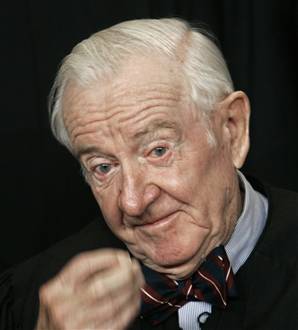
cross-referenced news and research resources about
Justice John Paul Stevens
John Paul Stevens (born April 20, 1920) is currently the most senior Associate Justice of the Supreme Court of the United States. He joined the Court in 1975 and is the oldest and longest-serving incumbent member of the Court. He was appointed to the court by Republican President Gerald Ford. Although Stevens is widely considered to be on the liberal side of the court, Ford praised Stevens in 2005: "He is serving his nation well, with dignity, intellect and without partisan political concerns." He is also the only current Justice to have served under three Chief Justices (Burger, Rehnquist, and Roberts).
Stevens was born on April 20, 1920, in Chicago, Illinois, to a wealthy family. His paternal grandfather had formed an insurance company and held real estate in Chicago, while his great-uncle owned the Chas. A. Stevens department store. His father, Ernest James Stevens, was a lawyer who later became a hotelier, owning two hotels, the La Salle and the Stevens Hotel. He lost ownership of the hotels during the Great Depression and was convicted of embezzlement (the conviction was later overturned). (The Stevens Hotel was subsequently bought by Hilton Hotels and is today the Chicago Hilton and Towers.) His mother, Elizabeth Maude Street Stevens, a native of Michigan City, Indiana, was a high school English teacher. Two of his three older brothers also became lawyers.
|
 Justice John Paul Stevens
|

|
updated Mon. May 6, 2024
-
ColorLines magazine
March 13, 2018
On the eve of his retirement in 2010, Justice John Paul Stevens trenchantly observed that, with the exception of Ruth Bader Ginsburg and potentially Sonia Sotomayor, each of the eleven justices who joined the court since 1975, including himself, was more conservative than the justice he or she replaced.
Emporia Gazette
March 12, 2018
But our Second Amendment, written for a time of one-shot muskets, does not translate well in today's advanced-technology world. This issue is complex, and discussed in the book “Six Amendments: How and Why We Should Change the Constitution” by retired Supreme Court Judge John Paul Stevens.
Madison.com
March 11, 2018
Read Justice Antonin Scalia's opinion in the Heller case and Justice John Paul Stevens' dissent and it's clear that both sides search for context at the time of the Bill of Rights ratification because of how vacuous and out of date the Second Amendment has become. No clause of the Bill of Rights should beÃâà...
STLtoday.com
March 10, 2018
I believe that the Second Amendment of our Constitution is being misinterpreted. It was clearly written to maintain "a well-regulated militia" to defend the individual states against the federal government, with a standing army, from interfering with their rights as the British had in recent memory. It was neverÃâà...
Lexington Herald Leader
March 9, 2018
In dissent, Justice John Paul Stevens noted that the founders conditioned the Second Amendment on militia service only. It was a 5-4 decision. Truth and sanity are but one vote away. We'll get there, it's just a matter of time. Gun control is just one part of the solution. We must also invest in a governmentÃâà...
Chico News & Review
March 8, 2018
John Paul Stevens served as an associate justice of the Supreme Court from 1975 to 2010. In his book Six Amendments: How and Why We Should Change the Constitution, he writes that five words should be added to the Second Amendment: “A well regulated Militia, being necessary to the security of aÃâà...
Constitution Daily (blog)
March 8, 2018
“The State's enforcement of the use tax against Quill places an unconstitutional burden on interstate commerce,” said Justice John Paul Stevens. The Court then said that the “underlying issue here is one that Congress may be better qualified to resolve, and one that it has the ultimate power to resolve.”.
Boulder Daily Camera
March 2, 2018
After the Sandy Hook Elementary School shooting murders in 2012, retired Supreme Court Justice John Paul Stevens wrote a book, "Six Amendments: How and Why We Should Change the Constitution." One proposal was to add a clause to the Second Amendment, so it would now read: "A well regulatedÃâà...
Slate Magazine
February 27, 2018
The dissenters—Justices John Paul Stevens, Sandra Day O'Connor, and David Souter—thought the 100-foot area was too broad and that such a large buffer zone was unnecessary given the legitimacy of “heightened regulation of the polling place” itself. Stevens added that “there is no disagreement thatÃâà...
STLtoday.com
February 27, 2018
John Paul Stevens reports that “for over 200 years following the adoption of that amendment federal judges uniformly understood that the right protected by the text is limited two ways: first, it applies only to keeping and bearing arms for military purposes, and second, while it limited the power of the federalÃâà...
Slate Magazine
February 26, 2018
Heller, Justice John Paul Stevens noted that the Second Amendment itself did not exist to give unfettered rights to gun owners at the expense of communal interests to be safe from guns via sensible regulation. Rather its purpose was to balance these rights, allowing for such regulations “so long as they doÃâà...
New York Times
February 19, 2018
WASHINGTON — Supreme Court justices say they do not act politically when they decide cases. But they freely admit to taking account of politics in deciding when to retire. Most justices, for instance, try to step down under politically like-minded presidents. “That's not 100 percent true,” Chief Justice WilliamÃâà...
Esquire.com
December 31, 1999
—Associate Justice John Paul Stevens, writing for the Court, Clinton v. Jones, May 27, 1997. The above presumption—that allowing Paula Jones' lawsuit against President Bill Clinton would not unduly occupy his time—ultimately was proven to be ... ah ... less than prescient. More relevant to our currentÃâà...
|
news and opinion
|
|
|
john paul stevens
US Supreme Court justices:
john paul stevens
|
|